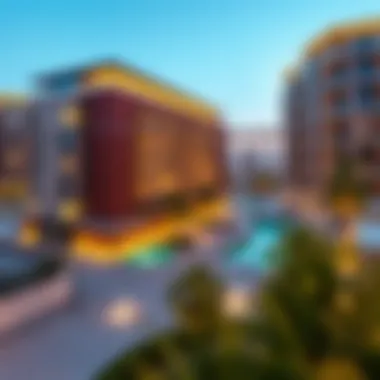Empire Development in JVC: A Deep Dive into Dubai's Market


Intro
Empire development is a term that encapsulates a myriad of factors influencing the growth and evolution of urban spaces. In the case of Dubai, particularly in areas like Jumeirah Village Circle (JVC), the notion takes on a unique character. This comprehensive guide dives into the intricacies of empire development in JVC, making the case for its significance in navigating the fast-paced real estate market of Dubai.
Market Trends
The real estate landscape in JVC is not just a reflection of current demands but is also shaped by a variety of market forces, making it a pivotal location for both local and international investors.
Current Property Prices
As of late 2023, property prices in JVC exhibit a range of fluctuations, influenced by various factors including location, property type, and market demand. Studio apartments typically range from AED 500,000 to AED 800,000, while larger configurations, like three-bedroom villas, can command prices upwards of AED 1.6 million. The rise in prices has been attributed to multiple developments sprouting in and around JVC, fostering a community atmosphere that many find appealing.
Additionally, potential buyers should keep an eye on the intricacies of supply versus demand—while there’s an evident increase in properties, the competition remains tight. Whether looking for a modest accommodation or a lavish abode, understanding the neighborhood dynamics is crucial.
Future Market Predictions
Looking ahead, industry analysts predict that JVC will continue to experience growth in property values, albeit at a steady pace. The ongoing infrastructural projects and community developments are likely to keep the desirability quotient high. Some experts suggest that property values could appreciate by 5% to 10% over the next year, as new amenities and lifestyle options enhance the living experience.
"Investing in JVC is not merely about acquiring property; it’s about becoming part of a broader urban narrative."
Investment Strategies
Navigating the complexities of real estate investment in JVC requires a keen understanding of various strategies that can optimize returns. For potential investors, knowing the ropes can make all the difference.
Smart Buying Tips
- Research Extensively: Understand the community—visit JVC, engage with local real estate agents, and join forums like Reddit or Facebook groups focused on Dubai real estate.
- Timing is Key: While it might be tempting to rush into a purchase, timing your buy can affect your return. Consider acquiring properties during off-peak seasons for better deals.
- Focus on Scalability: Consider properties that allow for future improvements, which can increase your property’s value in the long run.
Financing Options
Financing in JVC can be straightforward, but one must navigate the landscape carefully. Here are several avenues:
- Mortgage Loans: Various banks in the UAE offer competitive rates for mortgages. Understanding the down payment requirements and interest rates is crucial.
- International Buyer Options: If you're an expatriate, many banks cater specifically to non-resident buyers, providing tailored mortgage packages.
- Developer Financing Plans: Some developers offer financing options directly to buyers, often with flexible payment plans that can make purchasing more manageable.
In summary, the Jumeirah Village Circle stands as a testament to the innovative approaches and strategic planning that characterize empire development in Dubai. It serves not just as a residential area but as a bustling hub for investment, underscoring the evolving dynamics of the Dubai real estate market.
Understanding Empire Development
Empire development, particularly within the context of Jumeirah Village Circle (JVC), underscores a significant economic and social evolution in Dubai's real estate landscape. This concept goes beyond mere construction; it encapsulates a vision for communities, fostering not just residential growth but also enhancing lifestyle, culture, and social connectivity.
By examining empire development, one can discern its pivotal role in shaping urban areas. It facilitates the harmonization of various sectors – real estate, retail, entertainment, and community services ensuring they are operated collectively. For investors and homeowners alike, understanding this nuances is crucial. One gets insight into the long-term value retention of properties, the sustainability of investment decisions, and the potential for community engagement. These factors ultimately influence market stability and growth prospects.
Defining Empire Development
At its core, empire development can be defined as the strategic planning and implementation of large-scale projects that aim to create cohesive urban environments. This approach often involves an integration of diverse elements like residential spaces, commercial establishments, and public amenities.
In essence, empire development is about building not just structures, but societies that thrive. It reflects a shift from isolated developments to clusters of interconnected neighborhoods, ensuring accessibility and quality of life for residents.
Historical Context of Empire Development
Understanding the historical context of empire development requires a look back at industrialization and urbanization phases across the globe. In many cities, rapid population growth necessitated the creation of planned communities, leading to a more organized approach to urban expansion. In Dubai, the architecture and urban planning have embraced modernity while respecting tradition, leading to the emergence of iconic settings like JVC.
Dubai’s evolution presents a case study of how strategic visionaries converted arid deserts into thriving hubs, demonstrating tenacity and foresight. Changes in governmental policies, economic conditions, and global practices greatly influenced the steps toward developing Dubai’s residential and commercial landscapes, with JVC being a noteworthy example during the 2000s.
Key Principles and Practices
When discussing the key principles of empire development, several ideals stand out. First is community-centered design, which prioritizes the needs of the people. The next principle often seen in successful empire development projects is sustainability. Planners are increasingly integrating green spaces, renewable energy sources, and environmentally-friendly materials into their designs.
- Connectivity is another essential aspect, both in terms of physical transport systems and virtual connectivity, fostering a sense of belonging.
- Diversity plays a vital role as well; varying residential options accommodate different economic levels, ensuring inclusivity.
Often, successful empire development is marked by the people’s involvement in the planning processes. Ensuring that feedback from residents is taken seriously often helps mitigate issues that arise post-construction while influencing future developments. This participatory approach advocates a sense of ownership and pride among residents.


The importance of proactive community involvement in development cannot be overstated. When residents feel heard, they contribute to a more vibrant and cohesive neighborhood.
These principles guide developers and planners to create not just houses, but well-rounded communities where people can thrive and flourish in their day-to-day lives.
Jumeirah Village Circle Overview
The Jumeirah Village Circle (JVC) stands as a remarkable testament to modern urban planning and development in Dubai. Its design and infrastructure not only cater to a rapidly growing population but also serve as a microcosm of the evolving real estate dynamics in the region. This section provides an essential snapshot of JVC, detailing its location, planned development initiatives, and community features, all of which contribute to its significance in the emirate's burgeoning real estate landscape.
Location and Accessibility
One of JVC's standout features is its strategic location, nestled between Dubai’s bustling urban centers like Dubai Marina, Al Barsha, and the iconic Palm Jumeirah. This prime positioning places residents and businesses within arm’s reach of major thoroughfares such as Sheikh Mohammed Bin Zayed Road and Al Khail Road, facilitating easy access to the heart of Dubai and beyond. With a thoughtfully designed transport network, including dedicated bus routes and proximity to the Dubai Metro, the area is proving to be attractive not just for investors but also for families and expatriates alike. The seamless connectivity enables residents to enjoy both work and leisure, minimizing the stress of daily commuting. In a nutshell, JVC's location is a significant draw for anyone looking to dive into Dubai's real estate market.
Planned Development and Infrastructure
JVC is more than just a collection of buildings; it embodies a vision for sustainable urban living. The area is characterized by a mix of residential and commercial properties, featuring villas, apartments, and retail spaces, all thoughtfully integrated into the overall design. The development is laid out around a series of interconnected parks, green spaces, and community hubs aimed at fostering a neighborhood feel.
As for infrastructure, JVC is equipped with modern amenities designed to meet the needs of its inhabitants. Key infrastructure elements include:
- Well-planned road networks that reduce congestion
- Spacious parks for recreational activities
- Community centers that host events and activities
- Efficient waste management systems to promote sustainability.
JVC is witnessing a surge in projects aimed at enhancing its appeal further. Noteworthy developments include luxury apartments with stunning views, sprawling villas with access to private gardens, and commercial spaces designed to cater to the needs of local entrepreneurs. These projects are not just built; they are crafted with a keen eye on future demands, showcasing how forward-thinking planning can shape a community.
Community Features and Amenities
Another strong point about JVC is its robust array of community features and amenities. This family-friendly environment fosters a sense of belonging while promoting a lifestyle that embraces both relaxation and social engagement.
Some notable features are:
- Parks and Green Spaces: Thoughtful layouts include parks with walking trails, picnic areas, and children's play zones, encouraging outdoor activities.
- Retail Outlets: The community is home to local shops, supermarkets, and eateries that enhance daily living, offering convenience while supporting local businesses.
- Schools and Healthcare Facilities: Proximity to international schools and well-equipped medical facilities signifies the area’s commitment to providing essential services.
- Cultural Amenities: JVC includes spaces for art, culture, and leisure, ensuring a well-rounded community atmosphere.
The blend of accessibility, well-planned infrastructure, and a vibrant community creates an ideal environment for investors, homeowners, and expatriates looking to secure a foothold in Dubai.
Economic Factors Influencing JVC
The economic landscape of Jumeirah Village Circle (JVC) is pivotal in understanding its development and growth trajectory. It encompasses various elements—market trends, investment opportunities, and comparisons with other developments—that collectively shape the real estate environment. By delving into these crucial factors, we gain a clearer insight into what makes JVC a hotspot for real estate investors and homeowners alike.
Market Trends in Dubai Real Estate
In recent years, Dubai's real estate market has experienced fluctuations, yet JVC remains resilient. One significant trend is the increasing demand for affordable housing. With high-profile developments in the luxury sector, JVC provides a contrasting yet essential offering: reasonably priced yet high-quality living spaces. This balance caters to diverse demographics, from young professionals and families to expatriates looking for a home in the UAE.
Several factors contribute to this trend:
- Population Growth: A steady influx of expatriates is contributing to a growing demand for housing. JVC's strategic location enables residents easy access to surrounding areas, making it increasingly attractive.
- Government Initiatives: Policies like Long-Term Residence Visas and investor-friendly regulations encourage foreign investment, further driving the market.
- Rental Yields: Investors consistently find appealing rental yields in JVC, which often exceed those found in other regions of Dubai, making it a profitable venture.
"The real estate sector in Dubai is not just about bricks and mortar but also about fostering community and connectivity."
Investment Opportunities in JVC
When it comes to investment, JVC offers a plethora of opportunities. The ongoing development projects are designed to elevate the standard of living, increase property values, and enhance overall community experiences. Factors that enhance these investment opportunities include:
- Diverse Property Options: From apartments to townhouses, the versatility in property options caters to various investors. Whether looking for residential units or commercial spaces, JVC has it all.
- Strategic Partnerships: Developers are increasingly collaborating with local and international investors to boost the quality of developments, leading to a more appealing product.
- Modern Amenities: Future projects promise cutting-edge amenities—like smart home technology and recreational spaces—which can increase property attractiveness and value.
JVC is becoming synonymous with potential and growth, enticing investors who wish to capitalize on the vibrant real estate market.
Comparative Analysis with Other Developments
In comparison to other developments in Dubai, JVC holds its ground firmly. While places like Downtown Dubai and Dubai Marina cater to premium markets, JVC promotes a more community-centered approach. Unlike glitzy high-rises, JVC balances residential, commercial, and recreational spaces in a way that appeals to families and community-oriented individuals.
Several distinctive attributes make JVC stand out:
- Affordability: JVC provides relatively lower entry barriers for investors compared to other high-end areas. This aspect encourages a wider range of buyers.
- Community Feel: The architecture and layout are designed to foster a sense of community, which stands in contrast to areas where living is largely solitary, with high-density residential towers.
- Future Prospect: The area is under continuous scrutiny for further enhancements and growth opportunities, putting JVC on a growth trajectory that is both deliberate and expansive.


In summary, the economic factors influencing Jumeirah Village Circle form a vital part of its overall appeal to investors and homebuyers. By understanding these dynamics, stakeholders can make more informed decisions that align with their goals in the ever-evolving landscape of Dubai’s real estate market.
The Role of Strategic Planning
Strategic planning serves as the backbone for successful development in Jumeirah Village Circle (JVC). It weaves together various aspects of urban design, community growth, and investment potential. In the rapidly evolving landscape of Dubai, effective strategic planning not only aligns with governmental policies but also addresses the needs and aspirations of stakeholders, making it a vital component of the empire development narrative.
The essence of strategic planning in JVC is rooted in its ability to provide a roadmap for development that accommodates future growth while maintaining sustainability. It ensures that every block of buildings, green park, and recreational area isn't just a product of random decisions, but rather the manifestation of careful consideration of various factors. The approach taken in JVC reflects a balance of economic, environmental, and social objectives.
Master Planning Techniques
Master planning techniques employed in JVC focus heavily on enhancing accessibility and promoting a high quality of life for residents and visitors alike. This includes a mixture of residential, commercial, and recreational spaces that cater to the diverse population residing in the area.
- Integrated Transport Systems: By ensuring efficient connectivity through road networks and public transportation options, JVC aims to minimize congestion. This not only helps in easing travel times but also promotes a more environmentally friendly approach to urban mobility.
- Zoning Strategies: Thoughtful zoning regulations are critical. They dictate how different spaces can be utilized, be it for residential, commercial, or mixed-use purposes. Master planners in JVC ensure these zones complement each other, fostering community interactions rather than isolating one segment from another.
"Strategic planning makes a community flourish; it ensures that every resident's needs matter and every investor's confidence is nurtured."
- Public Spaces Development: An emphasis on parks and public areas encourages a sense of community. The planning process takes into account how these spaces can enhance social cohesion and contribute positively to the area’s aesthetic, giving residents a place to gather and neighbors a chance to meet.
Sustainability in Urban Development
Sustainability is no longer just a buzzword; it has become a guiding principle in urban development. JVC has embraced sustainable practices across its development projects, addressing the pressing need for ecological responsibility.
- Green Building Standards: The adoption of green building codes ensures that constructions are energy-efficient and environmentally friendly. This includes implementing energy-saving technologies, water conservation methods, and sustainable materials in construction.
- Community Gardens and Green Zones: Incorporating natural elements into urban environments fosters biodiversity, while community gardens not only beautify the area but also encourage active participation from residents.
- Waste Management Plans: Effective waste management strategies are essential in any urban area. In JVC, planners have laid out protocols that promote recycling and reduce waste, thereby contributing to a cleaner environment.
In summary, the strategic planning efforts in JVC are a synergistic blend of foresight and innovation. By incorporating master planning techniques that prioritize sustainability and community welfare, JVC stands as a model for successful urban development in Dubai's complex real estate landscape.
Regulatory Framework Impacting Development
The surge in development within Jumeirah Village Circle (JVC) cannot be viewed in isolation from the underlying regulatory framework that shapes the real estate landscape in Dubai. This set of rules, guidelines, and policies is not merely administrative paperwork; it is a comprehensive structure designed to ensure sustainable growth, provide clarity for investors, and instill confidence among stakeholders. The intricate interplay among governmental policies, zoning regulations, and compliance measures forms the backbone against which development initiatives are propelled.
Government Policies and Guidelines
Government policies play a pivotal role in steering the growth trajectory of JVC. The UAE government, recognizing the importance of a robust real estate sector to the national economy, has laid down policies that prioritize transparency and provide a clear roadmap for developers and investors. For instance, the Real Estate Regulatory Agency (RERA) establishes norms that promote integrity in transactions while safeguarding buyer interests.
Adhering to these guidelines is paramount:
- Protecting Investors: Policies impose strict requirements for transparency, ensuring that all financial dealings are above board.
- Sustainable Development: Regulations mandate adherence to sustainability standards, promoting eco-friendly practices among developers.
- Flexible Ownership Models: Policies offer various ownership structures allowing expatriates and foreign investors to freely invest in JVC, significantly elevating its attractiveness as a prime investment locale.
Understanding and navigating these policies is crucial for any entity or individual eager to tap into the opportunities present in JVC. As they say, knowledge is power, and being well-versed in these regulations can make or break a deal.
Zoning Regulations in JVC
Zoning regulations are the rules that dictate land use and development density within Jumeirah Village Circle. They determine what can be built where and guide developers in designing properties that align with community needs and urban planning objectives.
Key aspects of zoning regulations in JVC include:
- Land Use Designation: Different zones may permit varied types of developments such as residential complexes, commercial establishments, and mixed-use properties.
- Height Restrictions: These regulations often dictate the maximum height of buildings, influencing the skyline and overall aesthetic of the area.
- Green Spaces and Amenities: Zoning laws also frequently require the inclusion of parks and community facilities, fostering a sustainable and enjoyable environment for residents.
Understanding these nuances helps investors gauge the potential of their developments and avoid costly missteps.
"Navigating through zoning regulations is not merely a legal obligation; it's a pathway to ensuring that the vision for JVC corresponds with the realities of community living."
In summary, the regulatory framework serves as a guiding compass in JVC's real estate landscape. For investors, developers, or even prospective homeowners, grasping these factors is essential in crafting informed decisions that align with both current trends and future projections in the bustling ecosystem of Dubai's real estate market.
Investor Perspectives on JVC
In the intricate fabric of Dubai's real estate landscape, the role of investor perspectives on Jumeirah Village Circle (JVC) can't be understated. JVC represents a unique blend of strategic location, community charm, and investment potential. Understanding how investors gauge these aspects can be enlightening, especially for those looking to navigate the complex waters of property acquisition in this dynamic area.
Investors are usually on the lookout for both stability and growth potential when considering JVC. The community is inherently appealing due to its affordability relative to other Dubai areas, which has in turn attracted a diverse demographic. Here are several key elements that investors often consider in this context:
- Market Evaluation: Investors often conduct thorough assessments of the local market dynamics. JVC has seen consistent demand, making it a hotspot for both potential residents and investors alike.
- Potential Rental Yields: With a growing expatriate population, rental demand has remained strong. Investors typically analyze the potential for high rental yields which JVC often provides, particularly for those targeting expatriates seeking quality living without breaking the bank.
- Capital Appreciation: Trends show that property values in JVC have shown solid upward trajectories, partly due to infrastructural investments, such as schools and hospitals, being developed in and around the area.


Considering these points amalgamates to a solid foundation for understanding JVC’s investment appeal and potential profitability.
Risk Assessment and Considerations
Investing in real estate, particularly in rapidly evolving markets like JVC, does not come without its share of risks. Here are some considerations:
- Market Volatility: Although JVC has shown resilience, the broader economic environment can bring about unexpected challenges, impacting property values.
- Regulatory Risks: Staying abreast of property laws and regulations in Dubai is crucial. Any changes can have significant implications for investors who are not prepared.
- Infrastructure Development: While new projects often enhance property value, they can also lead to construction delays or disruptions. Investors need to navigate these changes carefully.
Investors frequently develop contingency plans to mitigate these risks, making calculated decisions based on comprehensive market analysis and a keen eye on legislative changes.
Long-Term vs. Short-Term Investments
When it comes to JVC, the nature of investment—whether long-term or short-term—can dramatically influence an investor’s strategy and outcomes:
- Long-Term Investments: For those looking for stability in rental income and capital appreciation, a long-term investment in JVC can be solid growth strategy. Investors can benefit from increasing property values over time and can lock in favorable financing options.
- Short-Term Investments: Conversely, some investors may seek quick flips, capitalizing on the area's rising popularity. This often involves keeping a keen eye on market dynamics, trends and being ready to act swiftly on opportunities.
Community Engagement in Development Processes
Community engagement is pivotal when it comes to development processes within Jumeirah Village Circle (JVC). It fundamentally shapes the character and longevity of neighborhoods, particularly in a rapidly developing place like Dubai. Engaging local residents and stakeholders helps ensure that the development plans are reflective of the community's needs and aspirations. It creates a sense of ownership among the residents, resulting in better upkeep and enjoyment of the spaces created.
A few elements that stand out in community engagement include the need for transparent communication, consistent updates, and involvement in decision-making processes. Developers and planners often find that when they open dialogue with the potential residents, they can mitigate future issues and surprises. The more active community members are in shaping their environment, the more likely they are to support initiatives and agree to the proposed changes. This participatory approach not only nurtures trust but also brings about a wealth of ideas from those who will eventually inhabit the space.
Importance of Stakeholder Collaboration
Collaboration between various stakeholders is essential for effective community engagement. In the context of JVC, this includes local government authorities, developers, investors, and, crucially, the residents themselves. When each party is engaged and communicates openly, the benefits are manifold:
- Enhanced Innovation: Different perspectives can lead to innovative solutions that are more inclusive and responsive to community needs.
- Resource Optimization: By sharing insights and resources, stakeholders can avoid duplication of efforts and maximize impact.
- Reduced Conflicts: Early engagement helps address concerns before they escalate into conflicts, fostering a collaborative atmosphere where all voices are considered.
These collaborative relationships can also help in navigating the often-complex bureaucratic and regulatory landscape of Dubai’s development sector. The tensions between developer intentions and community needs can be bridged through shared goals and visions.
Feedback Mechanisms and Adaptability
For community engagement to be effective, establishing robust feedback mechanisms is crucial. These mechanisms allow residents and other stakeholders to voice their opinions and concerns about the proposed developments. Regular surveys, town hall meetings, and interactive online platforms are effective ways of gathering this feedback. These avenues make it easier for individuals to contribute their thoughts, ensuring that the development process is adaptive and responsive to real-world conditions.
The adaptability of development plans according to community input is vital in juggling the aspirations of diverse groups. If stakeholders are listened to, they are more likely to adapt their feedback positively. For example, if a developer acknowledges residents' concerns about traffic flow or parking facilities during the planning stages, incorporating these suggestions can lead to favorable outcomes for all parties involved.
"Engagement is not just about giving stakeholders a seat at the table; it's about ensuring their voices are heard and valued throughout the development process."
In essence, community engagement in development processes within JVC not only enriches the quality of planning and execution but also cultivates a vibrant, harmonious community. The benefits (like increased satisfaction, enhanced property values, and a positive living environment) all underscore the importance of treating community members as active participants rather than passive observers in the development of their own neighborhoods.
For more insights into community engagement, you might find the resources at CDC.gov useful, as they often highlight effective strategies for community interaction and participation.
Future Prospects for JVC Development
The Jumeirah Village Circle (JVC) stands at a crossroads, offering an intriguing perspective on future urban development. Understanding the prospects of JVC is not merely an eye towards investments; it’s a holistic view into how urban spaces evolve and what that means for the people living and working there. With a vision that fuses traditional elements with cutting-edge advancements, JVC is shaping up to be a significant player in Dubai's real estate landscape.
Several pivotal elements shape these future prospects. With the rise of the digital age, technological innovations play a crucial role in redefining urban environments. Real estate developers, investors, and even residents are becoming increasingly attuned to smart solutions that enhance everyday living. Also crucial is the surge in population and demand for housing. As Dubai attracts more expats and investors, JVC’s growth trajectory is set to climb significantly.
Technological Innovations and Smart City Concepts
When we talk about smart cities, we’re not just referring to flashy technology. It’s about creating livable spaces that integrate seamlessly into the lives of residents. In JVC, we are beginning to see how technology transforms both construction and everyday life.
- Smart Infrastructure: Integrated systems for lighting, transport, and waste management can streamline city operations. Imagine a place where streetlights adapt to pedestrian flow or trash bins alert collection services when full.
- Sustainability Practices: Developers are increasingly adopting green building techniques. Solar panels, rainwater harvesting, and energy-efficient designs are no longer just buzzwords; they’re becoming standard practice in developments across JVC.
"Incorporating technology and sustainability into urban planning is not just a trend—it's essential for meeting modern demands."
- Data-Driven Decisions: Urban planning is moving towards data analytics, allowing developers to make informed decisions based on population trends and traffic patterns. This can lead to better resource allocation and improved quality of life for residents.
By harnessing these technological innovations, developers can create communities that not only look good on paper but work fluidly in reality.
Projected Growth and Emerging Trends
The dynamics of real estate investment are continually changing, and JVC is no exception. Key trends are emerging that will influence its future landscape.
- Increased Residency: With ongoing developments and a concerted push to make the region more appealing, estimates suggest that the population in JVC will continue to grow. This translates to a sustained or even heightened demand for housing.
- Mixed-Use Developments: Residents are increasingly inclined towards mixed-use properties where they can live, work, and play within the same neighborhood. JVC developers are recognizing this trend and constructing spaces that cater to these desires.
- Affordable Housing: With rising property costs across Dubai, the demand for affordable housing is critical. JVC aims to strike a balance by offering options that are financially accessible while still providing quality amenities and infrastructure.
- Community Engagement: Developers are adopting a more community-centric approach, emphasizing resident feedback to create spaces that serve their needs. This trend is set to deepen the overall engagement between residents and developments.
As we look ahead, the potential of JVC seems to be boundless. Investors, homeowners, and developers have much to gain by being part of this evolving community. By embracing forthcoming trends and innovations, this area is poised to not just survive but thrive in the coming years.



